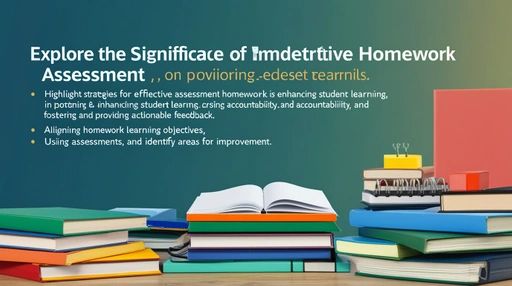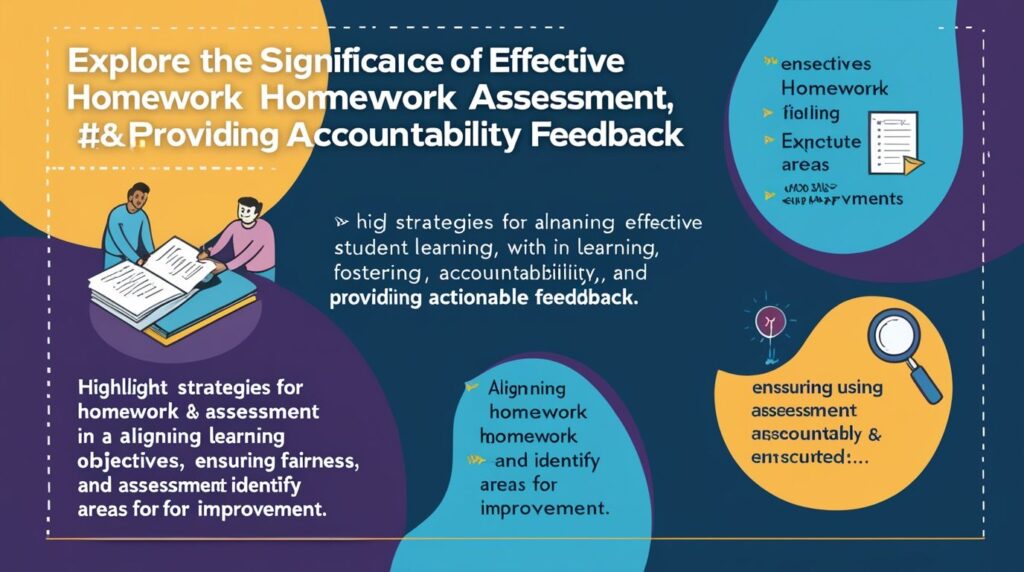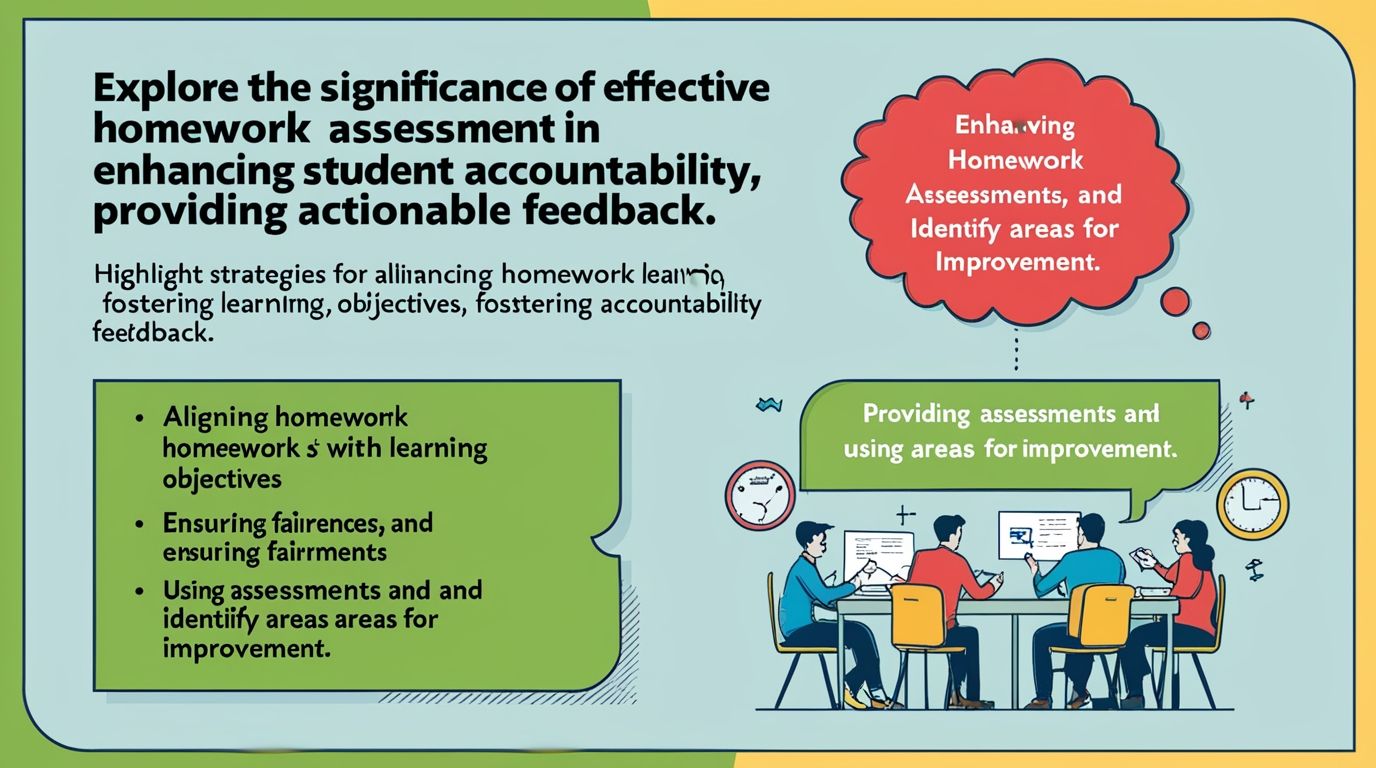Introduction
Effective Homework Assessment, Homework assessment is a vital aspect of the educational process. It not only gauges students’ understanding of subject material but also fosters a disciplined approach to learning, bridging the gap between classroom instruction and independent study. Effective homework assessment, however, requires more than just marking assignments. It involves a thoughtful strategy that promotes learning, ensures fairness, and provides valuable feedback to both students and teachers. This article delves into the elements, challenges, and strategies of effective homework assessment.
The Importance of Homework Assessment
Homework serves multiple purposes, from reinforcing classroom learning to encouraging self-directed study and critical thinking. Assessing this work effectively ensures that these objectives are met. A well-designed homework assessment strategy aligns with educational goals and provides students with opportunities to demonstrate their understanding in meaningful ways. Teachers benefit from the process by identifying areas where students struggle, thus refining their instructional approaches. Homework assessment also instills accountability in students, encouraging them to take their assignments seriously.
One of the critical reasons for assessing homework is to provide constructive feedback. Feedback helps students understand their mistakes, learn the correct concepts, and apply this understanding to future tasks. This ongoing dialogue between the teacher and the student builds a stronger teacher-student relationship and fosters an environment conducive to learning. Furthermore, regular homework assessment can act as a motivational tool, encouraging students to maintain consistency in their efforts and stay engaged with the curriculum.
Challenges in Homework Assessment
Despite its importance, homework assessment poses several challenges. One of the most significant issues is maintaining fairness and consistency. Teachers often face a diverse group of students with varying abilities, learning styles, and home environments, which can influence their capacity to complete assignments effectively. Ensuring that homework assignments are equitable and assessing them without bias requires careful planning and execution.
Time constraints also pose a challenge. Teachers are often burdened with numerous responsibilities, making it difficult to dedicate sufficient time to homework evaluation. This may lead to superficial assessments, depriving students of the detailed feedback they need to improve. Additionally, the sheer volume of homework, especially in schools with large class sizes, can make timely assessment a daunting task.
Another challenge lies in the relevance and quality of homework assignments. Poorly designed assignments that fail to align with learning objectives or lack clarity can make assessment meaningless. Teachers must ensure that homework tasks are purposeful, manageable, and directly related to the learning outcomes of their lessons.

Principles of Effective Homework Assessment
For homework assessment to be effective, it must adhere to certain principles. Firstly, it should be formative, focusing on learning and improvement rather than merely assigning grades. Formative assessment allows teachers to identify gaps in understanding and address them proactively.
Secondly, assessment should be consistent and transparent. Students should be aware of the criteria used to evaluate their work, ensuring that the process is fair and predictable. Clear rubrics or guidelines help set expectations and reduce ambiguity.
Thirdly, feedback must be actionable and timely. Providing feedback soon after submission helps students connect their mistakes to specific aspects of the assignment and apply corrections to future tasks. Feedback should not only highlight errors but also offer guidance on how to improve.
Finally, homework assessment should be adaptable. Teachers must consider the diverse needs and circumstances of their students, providing alternative means of completing assignments if necessary. Flexibility ensures that no student is unfairly disadvantaged due to factors beyond their control.
Strategies for Effective Homework Assessment
1. Use of Clear Rubrics
One of the most effective ways to assess homework is by using clear, detailed rubrics. A rubric outlines the expectations for an assignment, breaking it down into specific criteria such as content, organization, creativity, and accuracy. Each criterion is assigned a score or grade, making the evaluation process transparent and objective. Rubrics not only guide teachers in their assessment but also help students understand what is expected of them.
2. Peer and Self-Assessment
Incorporating peer and self-assessment into the homework evaluation process can be highly beneficial. Peer assessment encourages collaboration and allows students to learn from each other, while self-assessment fosters self-reflection and responsibility. Teachers can guide students in these processes by providing structured templates or questions to evaluate the work critically.
3. Incorporating Technology
Technology offers innovative solutions for homework assessment. Online platforms and learning management systems (LMS) enable teachers to track submissions, provide instant feedback, and even automate grading for certain types of assignments. Tools like quizzes, interactive exercises, and discussion forums make the process engaging for students and efficient for teachers.

4. Individualized Feedback
Personalized feedback is an essential aspect of effective homework assessment. While it may be time-consuming, it significantly impacts student learning. Teachers should aim to provide specific comments that address each student’s strengths and areas for improvement. Even a brief personalized note can make a student feel valued and motivated.
5. Linking Homework to Learning Objectives
Homework assignments should always align with learning objectives. This ensures that assessment focuses on skills and knowledge relevant to the curriculum. For example, a math assignment should assess problem-solving and numerical skills, while a literature assignment might evaluate comprehension and analytical abilities. Linking tasks to objectives helps maintain consistency and relevance in assessment.
6. Balancing Quantity and Quality
Excessive homework can overwhelm students and reduce the quality of their submissions. Teachers should prioritize quality over quantity, assigning tasks that are challenging yet manageable. This balance allows students to put in their best efforts and enables teachers to assess their work more effectively.
Role of Parents and Guardians in Homework Assessment
Parents and guardians play a crucial role in the homework process. While they are not directly involved in assessment, their support and involvement can significantly influence a child’s performance. Teachers can engage parents by sharing the purpose of assignments, offering strategies to support their children, and encouraging open communication. When parents understand the goals of homework and actively participate in the process, students are more likely to stay motivated and achieve better results.
Conclusion
Effective homework assessment is a multifaceted process that requires careful planning, dedication, and adaptability. It goes beyond assigning grades to fostering a deeper understanding of the subject matter, building critical thinking skills, and encouraging lifelong learning. By overcoming challenges, adhering to guiding principles, and implementing practical strategies, educators can make homework assessment a valuable component of the educational experience. This not only benefits students but also empowers teachers to enhance their teaching methods and achieve better educational outcomes.

5 thoughts on “Effective Homework Assessment”
Comments are closed.